Organisational Behaviour Report: Ryanair Airline, Module 12, 2020
VerifiedAdded on 2023/01/11
|15
|4700
|42
Report
AI Summary
This report provides a comprehensive analysis of Ryanair's organisational behaviour, focusing on how organisational culture, politics, and power influence individual and team behaviour and performance. It begins with an introduction to organisational behaviour and then delves into the impact of culture, utilizing Handy's cultural model to categorize Ryanair's culture and the implications of this culture on staff. The report also examines the different forms of power, using French and Raven's model to identify power dynamics within the company. Furthermore, it explores motivation theories, specifically Maslow's hierarchy of needs, and how they apply to employee motivation within Ryanair. The report also differentiates between effective and ineffective teams, applying concepts of team development theory and organizational behaviour philosophies to the business situation. Finally, the report concludes with a summary of the key findings and recommendations for Ryanair.
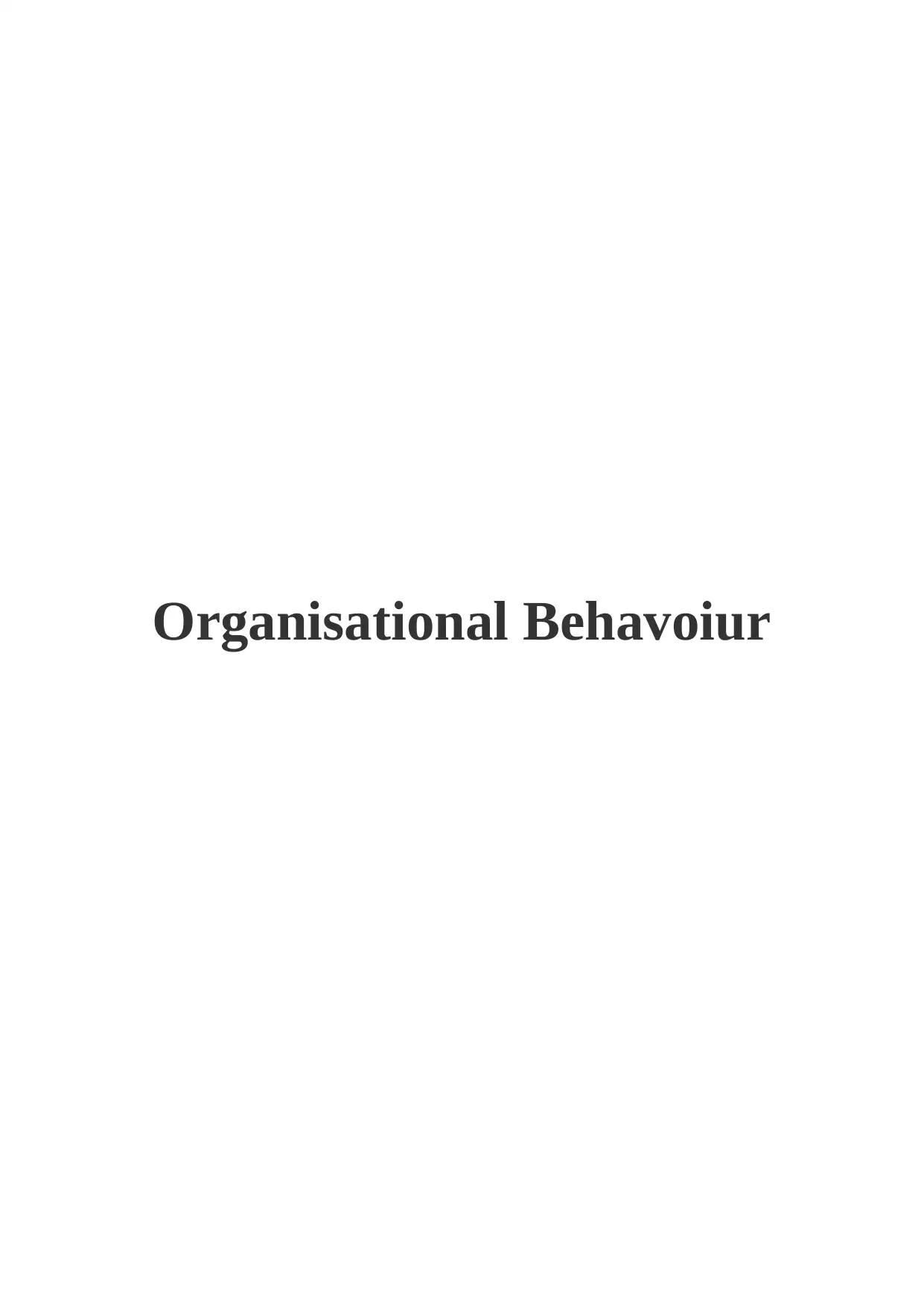
Organisational Behavoiur
Paraphrase This Document
Need a fresh take? Get an instant paraphrase of this document with our AI Paraphraser
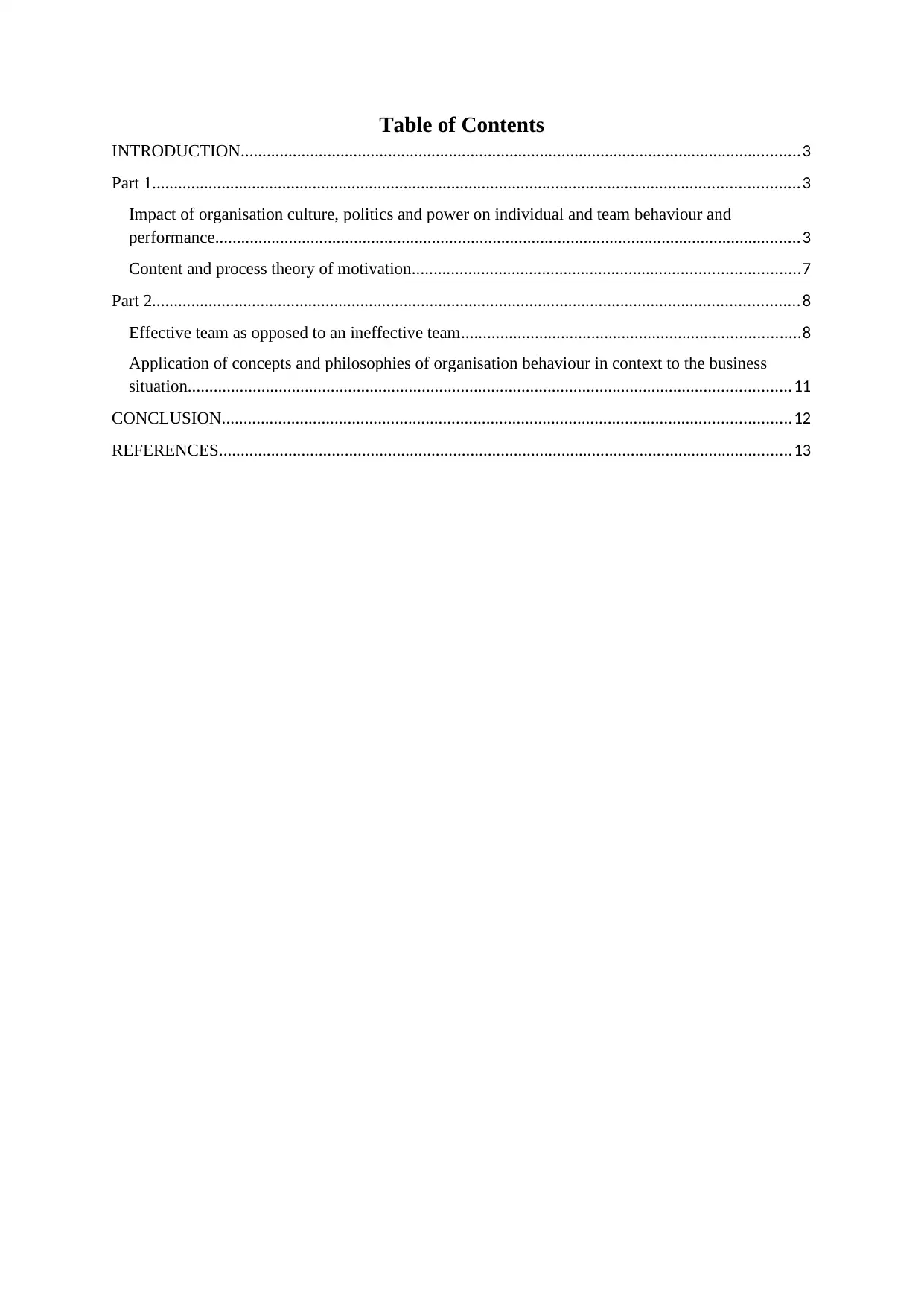
Table of Contents
INTRODUCTION.................................................................................................................................3
Part 1.....................................................................................................................................................3
Impact of organisation culture, politics and power on individual and team behaviour and
performance.......................................................................................................................................3
Content and process theory of motivation.........................................................................................7
Part 2.....................................................................................................................................................8
Effective team as opposed to an ineffective team..............................................................................8
Application of concepts and philosophies of organisation behaviour in context to the business
situation...........................................................................................................................................11
CONCLUSION...................................................................................................................................12
REFERENCES....................................................................................................................................13
INTRODUCTION.................................................................................................................................3
Part 1.....................................................................................................................................................3
Impact of organisation culture, politics and power on individual and team behaviour and
performance.......................................................................................................................................3
Content and process theory of motivation.........................................................................................7
Part 2.....................................................................................................................................................8
Effective team as opposed to an ineffective team..............................................................................8
Application of concepts and philosophies of organisation behaviour in context to the business
situation...........................................................................................................................................11
CONCLUSION...................................................................................................................................12
REFERENCES....................................................................................................................................13
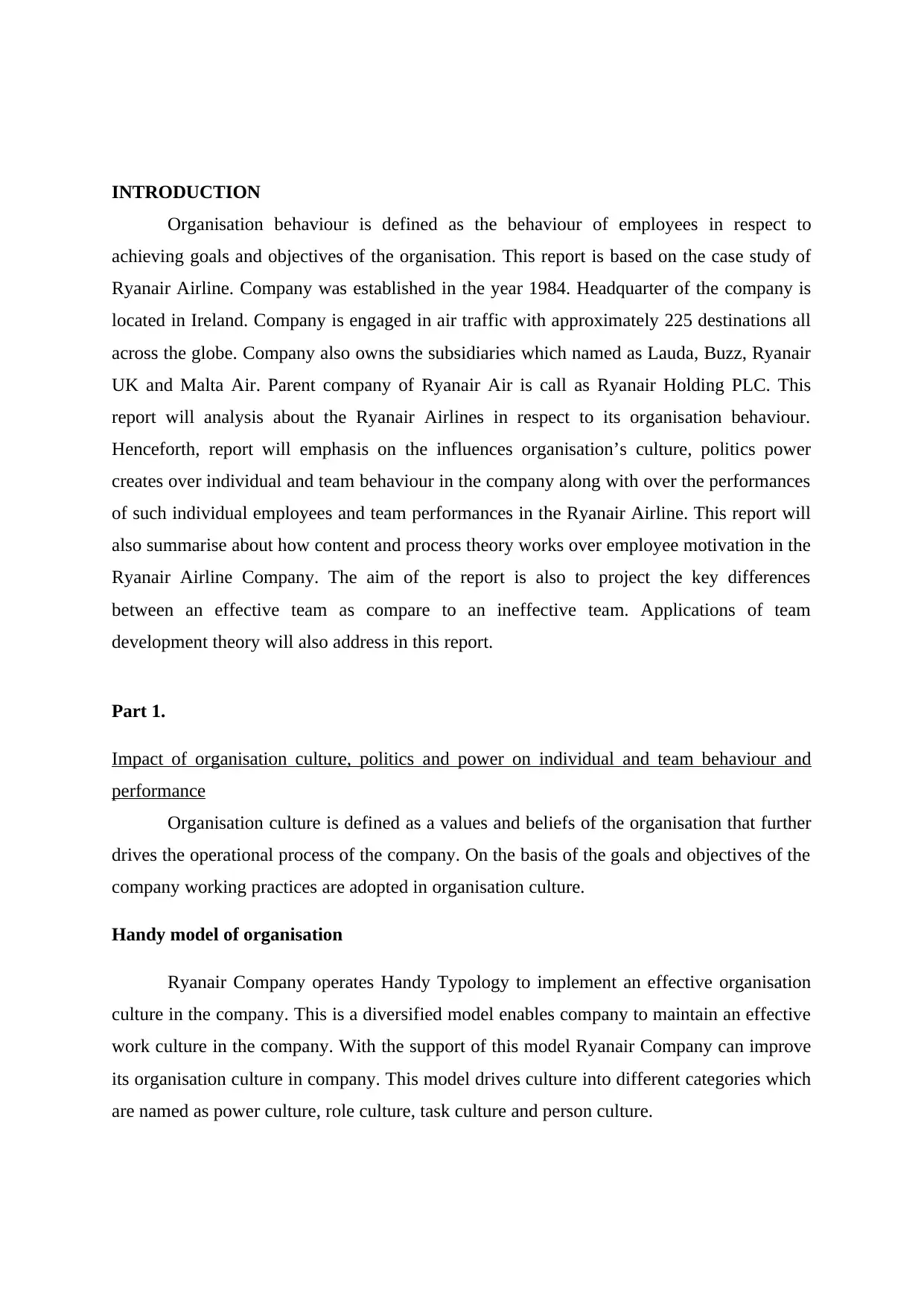
INTRODUCTION
Organisation behaviour is defined as the behaviour of employees in respect to
achieving goals and objectives of the organisation. This report is based on the case study of
Ryanair Airline. Company was established in the year 1984. Headquarter of the company is
located in Ireland. Company is engaged in air traffic with approximately 225 destinations all
across the globe. Company also owns the subsidiaries which named as Lauda, Buzz, Ryanair
UK and Malta Air. Parent company of Ryanair Air is call as Ryanair Holding PLC. This
report will analysis about the Ryanair Airlines in respect to its organisation behaviour.
Henceforth, report will emphasis on the influences organisation’s culture, politics power
creates over individual and team behaviour in the company along with over the performances
of such individual employees and team performances in the Ryanair Airline. This report will
also summarise about how content and process theory works over employee motivation in the
Ryanair Airline Company. The aim of the report is also to project the key differences
between an effective team as compare to an ineffective team. Applications of team
development theory will also address in this report.
Part 1.
Impact of organisation culture, politics and power on individual and team behaviour and
performance
Organisation culture is defined as a values and beliefs of the organisation that further
drives the operational process of the company. On the basis of the goals and objectives of the
company working practices are adopted in organisation culture.
Handy model of organisation
Ryanair Company operates Handy Typology to implement an effective organisation
culture in the company. This is a diversified model enables company to maintain an effective
work culture in the company. With the support of this model Ryanair Company can improve
its organisation culture in company. This model drives culture into different categories which
are named as power culture, role culture, task culture and person culture.
Organisation behaviour is defined as the behaviour of employees in respect to
achieving goals and objectives of the organisation. This report is based on the case study of
Ryanair Airline. Company was established in the year 1984. Headquarter of the company is
located in Ireland. Company is engaged in air traffic with approximately 225 destinations all
across the globe. Company also owns the subsidiaries which named as Lauda, Buzz, Ryanair
UK and Malta Air. Parent company of Ryanair Air is call as Ryanair Holding PLC. This
report will analysis about the Ryanair Airlines in respect to its organisation behaviour.
Henceforth, report will emphasis on the influences organisation’s culture, politics power
creates over individual and team behaviour in the company along with over the performances
of such individual employees and team performances in the Ryanair Airline. This report will
also summarise about how content and process theory works over employee motivation in the
Ryanair Airline Company. The aim of the report is also to project the key differences
between an effective team as compare to an ineffective team. Applications of team
development theory will also address in this report.
Part 1.
Impact of organisation culture, politics and power on individual and team behaviour and
performance
Organisation culture is defined as a values and beliefs of the organisation that further
drives the operational process of the company. On the basis of the goals and objectives of the
company working practices are adopted in organisation culture.
Handy model of organisation
Ryanair Company operates Handy Typology to implement an effective organisation
culture in the company. This is a diversified model enables company to maintain an effective
work culture in the company. With the support of this model Ryanair Company can improve
its organisation culture in company. This model drives culture into different categories which
are named as power culture, role culture, task culture and person culture.
⊘ This is a preview!⊘
Do you want full access?
Subscribe today to unlock all pages.

Trusted by 1+ million students worldwide
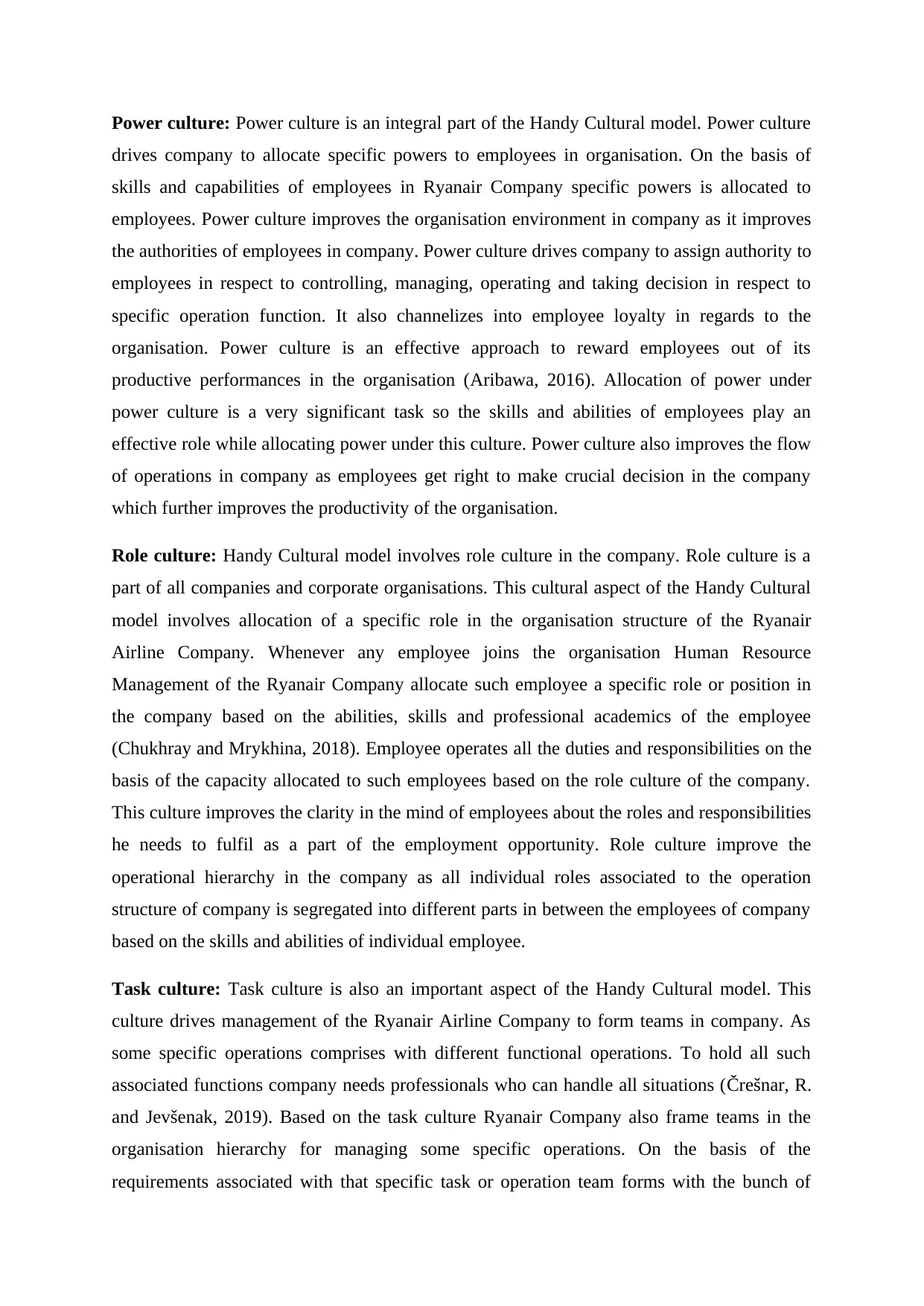
Power culture: Power culture is an integral part of the Handy Cultural model. Power culture
drives company to allocate specific powers to employees in organisation. On the basis of
skills and capabilities of employees in Ryanair Company specific powers is allocated to
employees. Power culture improves the organisation environment in company as it improves
the authorities of employees in company. Power culture drives company to assign authority to
employees in respect to controlling, managing, operating and taking decision in respect to
specific operation function. It also channelizes into employee loyalty in regards to the
organisation. Power culture is an effective approach to reward employees out of its
productive performances in the organisation (Aribawa, 2016). Allocation of power under
power culture is a very significant task so the skills and abilities of employees play an
effective role while allocating power under this culture. Power culture also improves the flow
of operations in company as employees get right to make crucial decision in the company
which further improves the productivity of the organisation.
Role culture: Handy Cultural model involves role culture in the company. Role culture is a
part of all companies and corporate organisations. This cultural aspect of the Handy Cultural
model involves allocation of a specific role in the organisation structure of the Ryanair
Airline Company. Whenever any employee joins the organisation Human Resource
Management of the Ryanair Company allocate such employee a specific role or position in
the company based on the abilities, skills and professional academics of the employee
(Chukhray and Mrykhina, 2018). Employee operates all the duties and responsibilities on the
basis of the capacity allocated to such employees based on the role culture of the company.
This culture improves the clarity in the mind of employees about the roles and responsibilities
he needs to fulfil as a part of the employment opportunity. Role culture improve the
operational hierarchy in the company as all individual roles associated to the operation
structure of company is segregated into different parts in between the employees of company
based on the skills and abilities of individual employee.
Task culture: Task culture is also an important aspect of the Handy Cultural model. This
culture drives management of the Ryanair Airline Company to form teams in company. As
some specific operations comprises with different functional operations. To hold all such
associated functions company needs professionals who can handle all situations (Črešnar, R.
and Jevšenak, 2019). Based on the task culture Ryanair Company also frame teams in the
organisation hierarchy for managing some specific operations. On the basis of the
requirements associated with that specific task or operation team forms with the bunch of
drives company to allocate specific powers to employees in organisation. On the basis of
skills and capabilities of employees in Ryanair Company specific powers is allocated to
employees. Power culture improves the organisation environment in company as it improves
the authorities of employees in company. Power culture drives company to assign authority to
employees in respect to controlling, managing, operating and taking decision in respect to
specific operation function. It also channelizes into employee loyalty in regards to the
organisation. Power culture is an effective approach to reward employees out of its
productive performances in the organisation (Aribawa, 2016). Allocation of power under
power culture is a very significant task so the skills and abilities of employees play an
effective role while allocating power under this culture. Power culture also improves the flow
of operations in company as employees get right to make crucial decision in the company
which further improves the productivity of the organisation.
Role culture: Handy Cultural model involves role culture in the company. Role culture is a
part of all companies and corporate organisations. This cultural aspect of the Handy Cultural
model involves allocation of a specific role in the organisation structure of the Ryanair
Airline Company. Whenever any employee joins the organisation Human Resource
Management of the Ryanair Company allocate such employee a specific role or position in
the company based on the abilities, skills and professional academics of the employee
(Chukhray and Mrykhina, 2018). Employee operates all the duties and responsibilities on the
basis of the capacity allocated to such employees based on the role culture of the company.
This culture improves the clarity in the mind of employees about the roles and responsibilities
he needs to fulfil as a part of the employment opportunity. Role culture improve the
operational hierarchy in the company as all individual roles associated to the operation
structure of company is segregated into different parts in between the employees of company
based on the skills and abilities of individual employee.
Task culture: Task culture is also an important aspect of the Handy Cultural model. This
culture drives management of the Ryanair Airline Company to form teams in company. As
some specific operations comprises with different functional operations. To hold all such
associated functions company needs professionals who can handle all situations (Črešnar, R.
and Jevšenak, 2019). Based on the task culture Ryanair Company also frame teams in the
organisation hierarchy for managing some specific operations. On the basis of the
requirements associated with that specific task or operation team forms with the bunch of
Paraphrase This Document
Need a fresh take? Get an instant paraphrase of this document with our AI Paraphraser
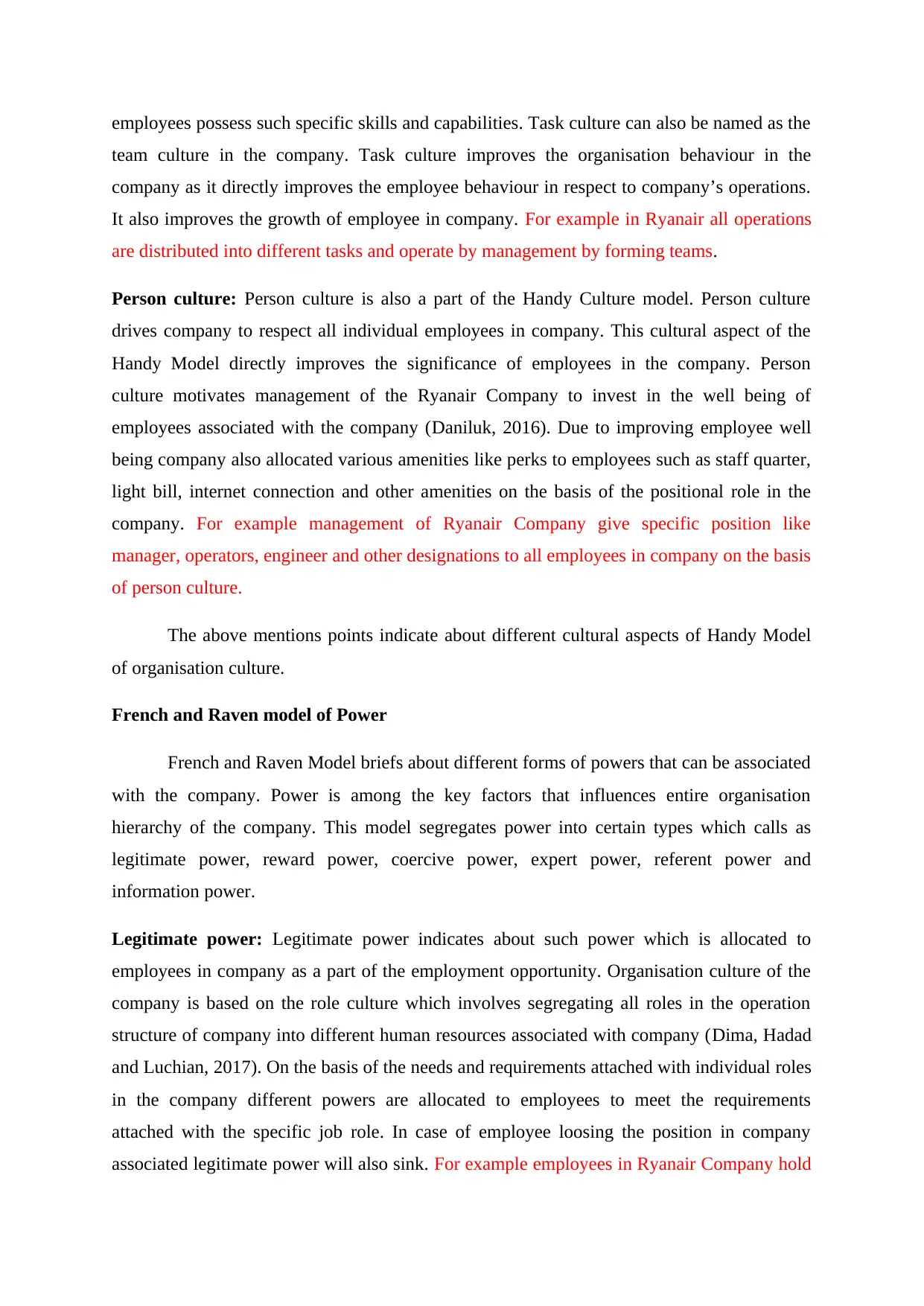
employees possess such specific skills and capabilities. Task culture can also be named as the
team culture in the company. Task culture improves the organisation behaviour in the
company as it directly improves the employee behaviour in respect to company’s operations.
It also improves the growth of employee in company. For example in Ryanair all operations
are distributed into different tasks and operate by management by forming teams.
Person culture: Person culture is also a part of the Handy Culture model. Person culture
drives company to respect all individual employees in company. This cultural aspect of the
Handy Model directly improves the significance of employees in the company. Person
culture motivates management of the Ryanair Company to invest in the well being of
employees associated with the company (Daniluk, 2016). Due to improving employee well
being company also allocated various amenities like perks to employees such as staff quarter,
light bill, internet connection and other amenities on the basis of the positional role in the
company. For example management of Ryanair Company give specific position like
manager, operators, engineer and other designations to all employees in company on the basis
of person culture.
The above mentions points indicate about different cultural aspects of Handy Model
of organisation culture.
French and Raven model of Power
French and Raven Model briefs about different forms of powers that can be associated
with the company. Power is among the key factors that influences entire organisation
hierarchy of the company. This model segregates power into certain types which calls as
legitimate power, reward power, coercive power, expert power, referent power and
information power.
Legitimate power: Legitimate power indicates about such power which is allocated to
employees in company as a part of the employment opportunity. Organisation culture of the
company is based on the role culture which involves segregating all roles in the operation
structure of company into different human resources associated with company (Dima, Hadad
and Luchian, 2017). On the basis of the needs and requirements attached with individual roles
in the company different powers are allocated to employees to meet the requirements
attached with the specific job role. In case of employee loosing the position in company
associated legitimate power will also sink. For example employees in Ryanair Company hold
team culture in the company. Task culture improves the organisation behaviour in the
company as it directly improves the employee behaviour in respect to company’s operations.
It also improves the growth of employee in company. For example in Ryanair all operations
are distributed into different tasks and operate by management by forming teams.
Person culture: Person culture is also a part of the Handy Culture model. Person culture
drives company to respect all individual employees in company. This cultural aspect of the
Handy Model directly improves the significance of employees in the company. Person
culture motivates management of the Ryanair Company to invest in the well being of
employees associated with the company (Daniluk, 2016). Due to improving employee well
being company also allocated various amenities like perks to employees such as staff quarter,
light bill, internet connection and other amenities on the basis of the positional role in the
company. For example management of Ryanair Company give specific position like
manager, operators, engineer and other designations to all employees in company on the basis
of person culture.
The above mentions points indicate about different cultural aspects of Handy Model
of organisation culture.
French and Raven model of Power
French and Raven Model briefs about different forms of powers that can be associated
with the company. Power is among the key factors that influences entire organisation
hierarchy of the company. This model segregates power into certain types which calls as
legitimate power, reward power, coercive power, expert power, referent power and
information power.
Legitimate power: Legitimate power indicates about such power which is allocated to
employees in company as a part of the employment opportunity. Organisation culture of the
company is based on the role culture which involves segregating all roles in the operation
structure of company into different human resources associated with company (Dima, Hadad
and Luchian, 2017). On the basis of the needs and requirements attached with individual roles
in the company different powers are allocated to employees to meet the requirements
attached with the specific job role. In case of employee loosing the position in company
associated legitimate power will also sink. For example employees in Ryanair Company hold
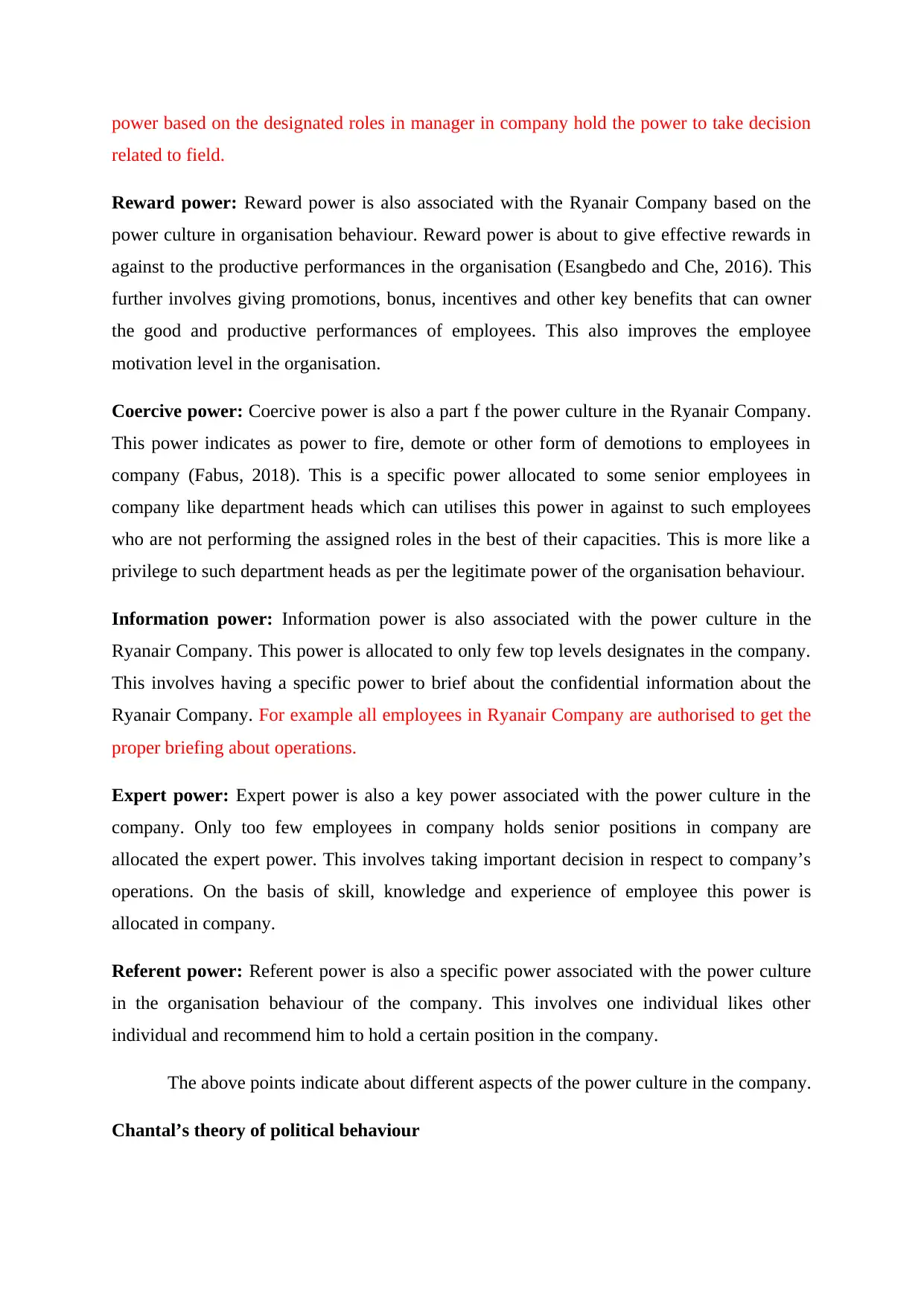
power based on the designated roles in manager in company hold the power to take decision
related to field.
Reward power: Reward power is also associated with the Ryanair Company based on the
power culture in organisation behaviour. Reward power is about to give effective rewards in
against to the productive performances in the organisation (Esangbedo and Che, 2016). This
further involves giving promotions, bonus, incentives and other key benefits that can owner
the good and productive performances of employees. This also improves the employee
motivation level in the organisation.
Coercive power: Coercive power is also a part f the power culture in the Ryanair Company.
This power indicates as power to fire, demote or other form of demotions to employees in
company (Fabus, 2018). This is a specific power allocated to some senior employees in
company like department heads which can utilises this power in against to such employees
who are not performing the assigned roles in the best of their capacities. This is more like a
privilege to such department heads as per the legitimate power of the organisation behaviour.
Information power: Information power is also associated with the power culture in the
Ryanair Company. This power is allocated to only few top levels designates in the company.
This involves having a specific power to brief about the confidential information about the
Ryanair Company. For example all employees in Ryanair Company are authorised to get the
proper briefing about operations.
Expert power: Expert power is also a key power associated with the power culture in the
company. Only too few employees in company holds senior positions in company are
allocated the expert power. This involves taking important decision in respect to company’s
operations. On the basis of skill, knowledge and experience of employee this power is
allocated in company.
Referent power: Referent power is also a specific power associated with the power culture
in the organisation behaviour of the company. This involves one individual likes other
individual and recommend him to hold a certain position in the company.
The above points indicate about different aspects of the power culture in the company.
Chantal’s theory of political behaviour
related to field.
Reward power: Reward power is also associated with the Ryanair Company based on the
power culture in organisation behaviour. Reward power is about to give effective rewards in
against to the productive performances in the organisation (Esangbedo and Che, 2016). This
further involves giving promotions, bonus, incentives and other key benefits that can owner
the good and productive performances of employees. This also improves the employee
motivation level in the organisation.
Coercive power: Coercive power is also a part f the power culture in the Ryanair Company.
This power indicates as power to fire, demote or other form of demotions to employees in
company (Fabus, 2018). This is a specific power allocated to some senior employees in
company like department heads which can utilises this power in against to such employees
who are not performing the assigned roles in the best of their capacities. This is more like a
privilege to such department heads as per the legitimate power of the organisation behaviour.
Information power: Information power is also associated with the power culture in the
Ryanair Company. This power is allocated to only few top levels designates in the company.
This involves having a specific power to brief about the confidential information about the
Ryanair Company. For example all employees in Ryanair Company are authorised to get the
proper briefing about operations.
Expert power: Expert power is also a key power associated with the power culture in the
company. Only too few employees in company holds senior positions in company are
allocated the expert power. This involves taking important decision in respect to company’s
operations. On the basis of skill, knowledge and experience of employee this power is
allocated in company.
Referent power: Referent power is also a specific power associated with the power culture
in the organisation behaviour of the company. This involves one individual likes other
individual and recommend him to hold a certain position in the company.
The above points indicate about different aspects of the power culture in the company.
Chantal’s theory of political behaviour
⊘ This is a preview!⊘
Do you want full access?
Subscribe today to unlock all pages.

Trusted by 1+ million students worldwide
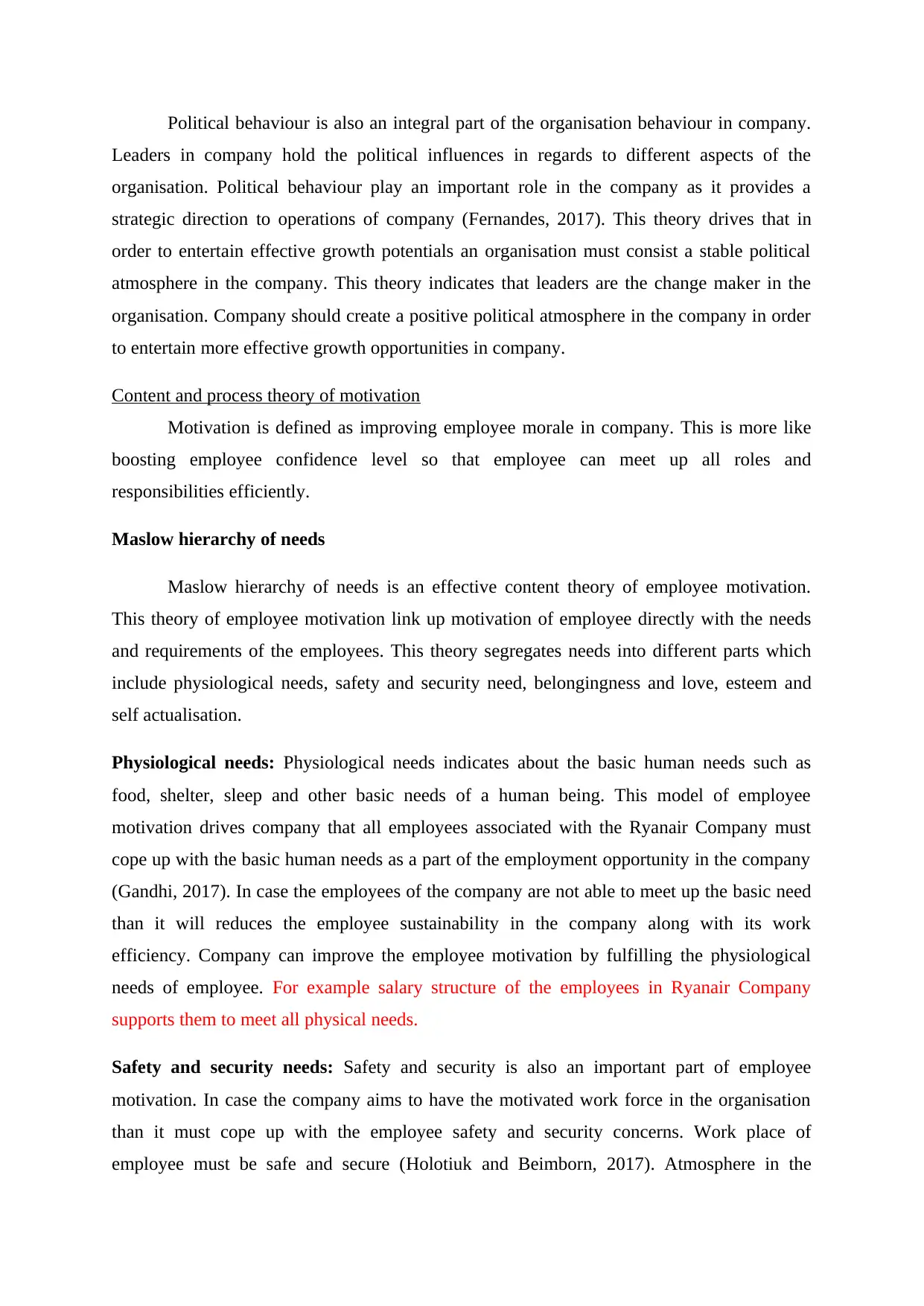
Political behaviour is also an integral part of the organisation behaviour in company.
Leaders in company hold the political influences in regards to different aspects of the
organisation. Political behaviour play an important role in the company as it provides a
strategic direction to operations of company (Fernandes, 2017). This theory drives that in
order to entertain effective growth potentials an organisation must consist a stable political
atmosphere in the company. This theory indicates that leaders are the change maker in the
organisation. Company should create a positive political atmosphere in the company in order
to entertain more effective growth opportunities in company.
Content and process theory of motivation
Motivation is defined as improving employee morale in company. This is more like
boosting employee confidence level so that employee can meet up all roles and
responsibilities efficiently.
Maslow hierarchy of needs
Maslow hierarchy of needs is an effective content theory of employee motivation.
This theory of employee motivation link up motivation of employee directly with the needs
and requirements of the employees. This theory segregates needs into different parts which
include physiological needs, safety and security need, belongingness and love, esteem and
self actualisation.
Physiological needs: Physiological needs indicates about the basic human needs such as
food, shelter, sleep and other basic needs of a human being. This model of employee
motivation drives company that all employees associated with the Ryanair Company must
cope up with the basic human needs as a part of the employment opportunity in the company
(Gandhi, 2017). In case the employees of the company are not able to meet up the basic need
than it will reduces the employee sustainability in the company along with its work
efficiency. Company can improve the employee motivation by fulfilling the physiological
needs of employee. For example salary structure of the employees in Ryanair Company
supports them to meet all physical needs.
Safety and security needs: Safety and security is also an important part of employee
motivation. In case the company aims to have the motivated work force in the organisation
than it must cope up with the employee safety and security concerns. Work place of
employee must be safe and secure (Holotiuk and Beimborn, 2017). Atmosphere in the
Leaders in company hold the political influences in regards to different aspects of the
organisation. Political behaviour play an important role in the company as it provides a
strategic direction to operations of company (Fernandes, 2017). This theory drives that in
order to entertain effective growth potentials an organisation must consist a stable political
atmosphere in the company. This theory indicates that leaders are the change maker in the
organisation. Company should create a positive political atmosphere in the company in order
to entertain more effective growth opportunities in company.
Content and process theory of motivation
Motivation is defined as improving employee morale in company. This is more like
boosting employee confidence level so that employee can meet up all roles and
responsibilities efficiently.
Maslow hierarchy of needs
Maslow hierarchy of needs is an effective content theory of employee motivation.
This theory of employee motivation link up motivation of employee directly with the needs
and requirements of the employees. This theory segregates needs into different parts which
include physiological needs, safety and security need, belongingness and love, esteem and
self actualisation.
Physiological needs: Physiological needs indicates about the basic human needs such as
food, shelter, sleep and other basic needs of a human being. This model of employee
motivation drives company that all employees associated with the Ryanair Company must
cope up with the basic human needs as a part of the employment opportunity in the company
(Gandhi, 2017). In case the employees of the company are not able to meet up the basic need
than it will reduces the employee sustainability in the company along with its work
efficiency. Company can improve the employee motivation by fulfilling the physiological
needs of employee. For example salary structure of the employees in Ryanair Company
supports them to meet all physical needs.
Safety and security needs: Safety and security is also an important part of employee
motivation. In case the company aims to have the motivated work force in the organisation
than it must cope up with the employee safety and security concerns. Work place of
employee must be safe and secure (Holotiuk and Beimborn, 2017). Atmosphere in the
Paraphrase This Document
Need a fresh take? Get an instant paraphrase of this document with our AI Paraphraser
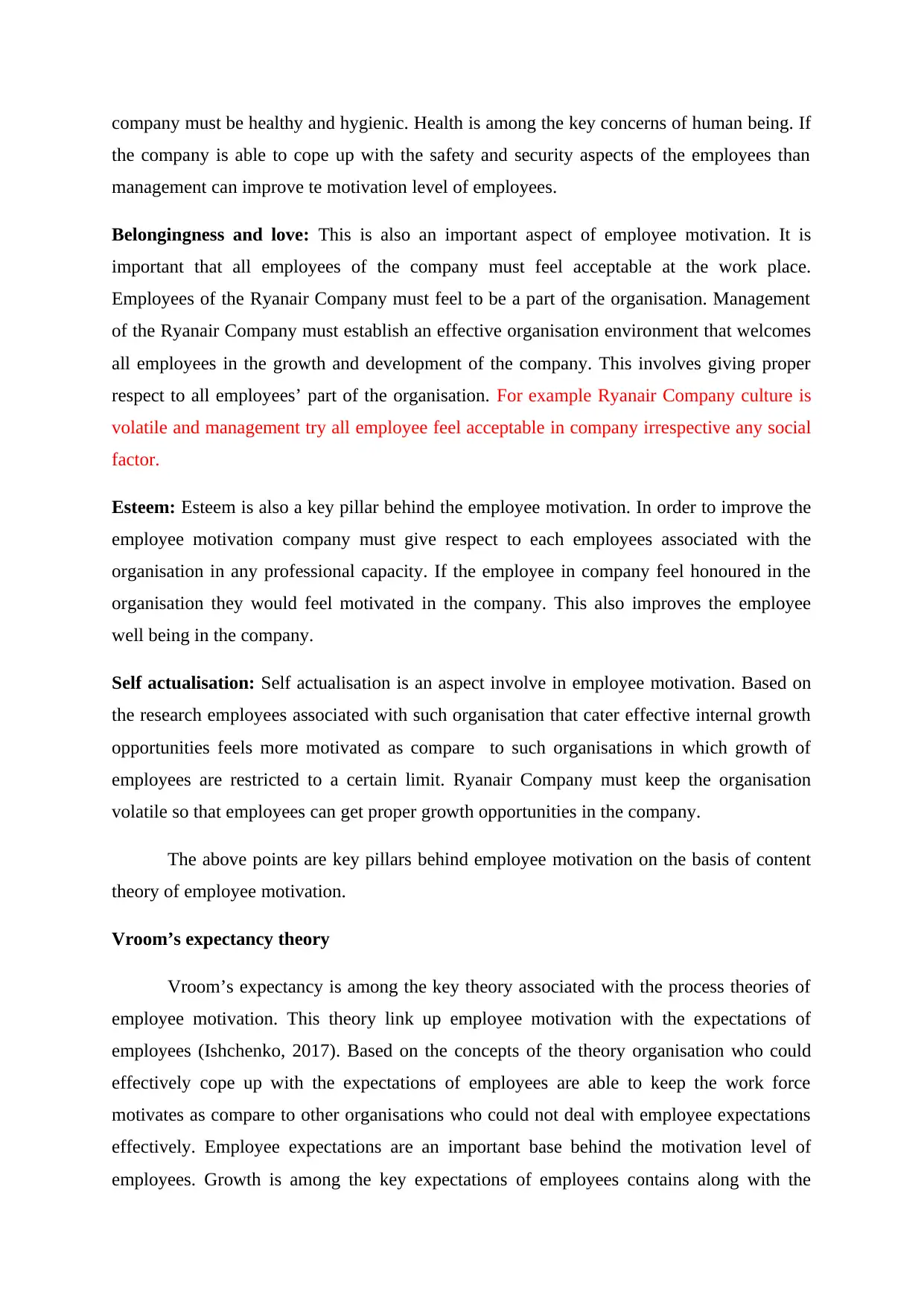
company must be healthy and hygienic. Health is among the key concerns of human being. If
the company is able to cope up with the safety and security aspects of the employees than
management can improve te motivation level of employees.
Belongingness and love: This is also an important aspect of employee motivation. It is
important that all employees of the company must feel acceptable at the work place.
Employees of the Ryanair Company must feel to be a part of the organisation. Management
of the Ryanair Company must establish an effective organisation environment that welcomes
all employees in the growth and development of the company. This involves giving proper
respect to all employees’ part of the organisation. For example Ryanair Company culture is
volatile and management try all employee feel acceptable in company irrespective any social
factor.
Esteem: Esteem is also a key pillar behind the employee motivation. In order to improve the
employee motivation company must give respect to each employees associated with the
organisation in any professional capacity. If the employee in company feel honoured in the
organisation they would feel motivated in the company. This also improves the employee
well being in the company.
Self actualisation: Self actualisation is an aspect involve in employee motivation. Based on
the research employees associated with such organisation that cater effective internal growth
opportunities feels more motivated as compare to such organisations in which growth of
employees are restricted to a certain limit. Ryanair Company must keep the organisation
volatile so that employees can get proper growth opportunities in the company.
The above points are key pillars behind employee motivation on the basis of content
theory of employee motivation.
Vroom’s expectancy theory
Vroom’s expectancy is among the key theory associated with the process theories of
employee motivation. This theory link up employee motivation with the expectations of
employees (Ishchenko, 2017). Based on the concepts of the theory organisation who could
effectively cope up with the expectations of employees are able to keep the work force
motivates as compare to other organisations who could not deal with employee expectations
effectively. Employee expectations are an important base behind the motivation level of
employees. Growth is among the key expectations of employees contains along with the
the company is able to cope up with the safety and security aspects of the employees than
management can improve te motivation level of employees.
Belongingness and love: This is also an important aspect of employee motivation. It is
important that all employees of the company must feel acceptable at the work place.
Employees of the Ryanair Company must feel to be a part of the organisation. Management
of the Ryanair Company must establish an effective organisation environment that welcomes
all employees in the growth and development of the company. This involves giving proper
respect to all employees’ part of the organisation. For example Ryanair Company culture is
volatile and management try all employee feel acceptable in company irrespective any social
factor.
Esteem: Esteem is also a key pillar behind the employee motivation. In order to improve the
employee motivation company must give respect to each employees associated with the
organisation in any professional capacity. If the employee in company feel honoured in the
organisation they would feel motivated in the company. This also improves the employee
well being in the company.
Self actualisation: Self actualisation is an aspect involve in employee motivation. Based on
the research employees associated with such organisation that cater effective internal growth
opportunities feels more motivated as compare to such organisations in which growth of
employees are restricted to a certain limit. Ryanair Company must keep the organisation
volatile so that employees can get proper growth opportunities in the company.
The above points are key pillars behind employee motivation on the basis of content
theory of employee motivation.
Vroom’s expectancy theory
Vroom’s expectancy is among the key theory associated with the process theories of
employee motivation. This theory link up employee motivation with the expectations of
employees (Ishchenko, 2017). Based on the concepts of the theory organisation who could
effectively cope up with the expectations of employees are able to keep the work force
motivates as compare to other organisations who could not deal with employee expectations
effectively. Employee expectations are an important base behind the motivation level of
employees. Growth is among the key expectations of employees contains along with the
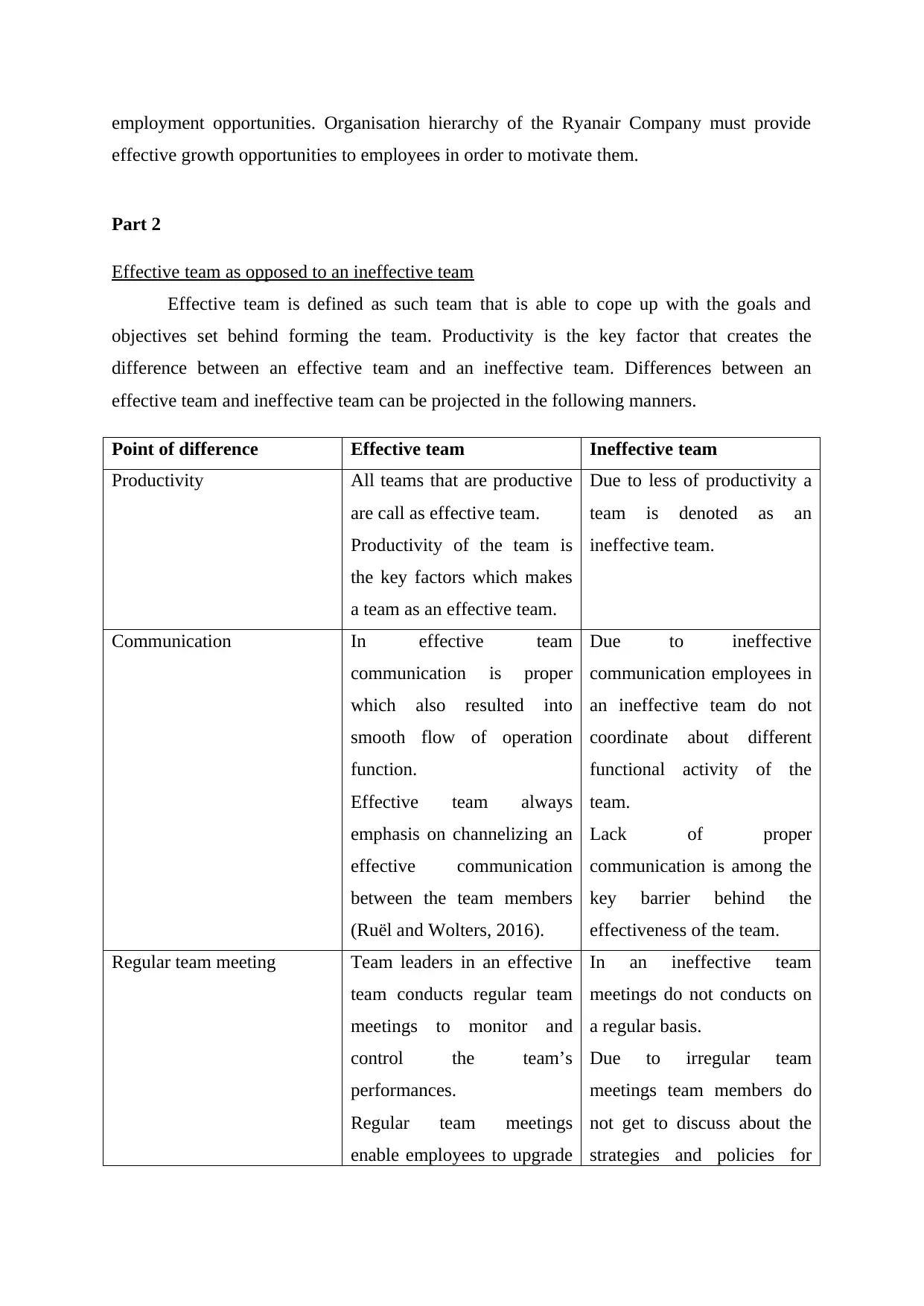
employment opportunities. Organisation hierarchy of the Ryanair Company must provide
effective growth opportunities to employees in order to motivate them.
Part 2
Effective team as opposed to an ineffective team
Effective team is defined as such team that is able to cope up with the goals and
objectives set behind forming the team. Productivity is the key factor that creates the
difference between an effective team and an ineffective team. Differences between an
effective team and ineffective team can be projected in the following manners.
Point of difference Effective team Ineffective team
Productivity All teams that are productive
are call as effective team.
Productivity of the team is
the key factors which makes
a team as an effective team.
Due to less of productivity a
team is denoted as an
ineffective team.
Communication In effective team
communication is proper
which also resulted into
smooth flow of operation
function.
Effective team always
emphasis on channelizing an
effective communication
between the team members
(Ruël and Wolters, 2016).
Due to ineffective
communication employees in
an ineffective team do not
coordinate about different
functional activity of the
team.
Lack of proper
communication is among the
key barrier behind the
effectiveness of the team.
Regular team meeting Team leaders in an effective
team conducts regular team
meetings to monitor and
control the team’s
performances.
Regular team meetings
enable employees to upgrade
In an ineffective team
meetings do not conducts on
a regular basis.
Due to irregular team
meetings team members do
not get to discuss about the
strategies and policies for
effective growth opportunities to employees in order to motivate them.
Part 2
Effective team as opposed to an ineffective team
Effective team is defined as such team that is able to cope up with the goals and
objectives set behind forming the team. Productivity is the key factor that creates the
difference between an effective team and an ineffective team. Differences between an
effective team and ineffective team can be projected in the following manners.
Point of difference Effective team Ineffective team
Productivity All teams that are productive
are call as effective team.
Productivity of the team is
the key factors which makes
a team as an effective team.
Due to less of productivity a
team is denoted as an
ineffective team.
Communication In effective team
communication is proper
which also resulted into
smooth flow of operation
function.
Effective team always
emphasis on channelizing an
effective communication
between the team members
(Ruël and Wolters, 2016).
Due to ineffective
communication employees in
an ineffective team do not
coordinate about different
functional activity of the
team.
Lack of proper
communication is among the
key barrier behind the
effectiveness of the team.
Regular team meeting Team leaders in an effective
team conducts regular team
meetings to monitor and
control the team’s
performances.
Regular team meetings
enable employees to upgrade
In an ineffective team
meetings do not conducts on
a regular basis.
Due to irregular team
meetings team members do
not get to discuss about the
strategies and policies for
⊘ This is a preview!⊘
Do you want full access?
Subscribe today to unlock all pages.

Trusted by 1+ million students worldwide
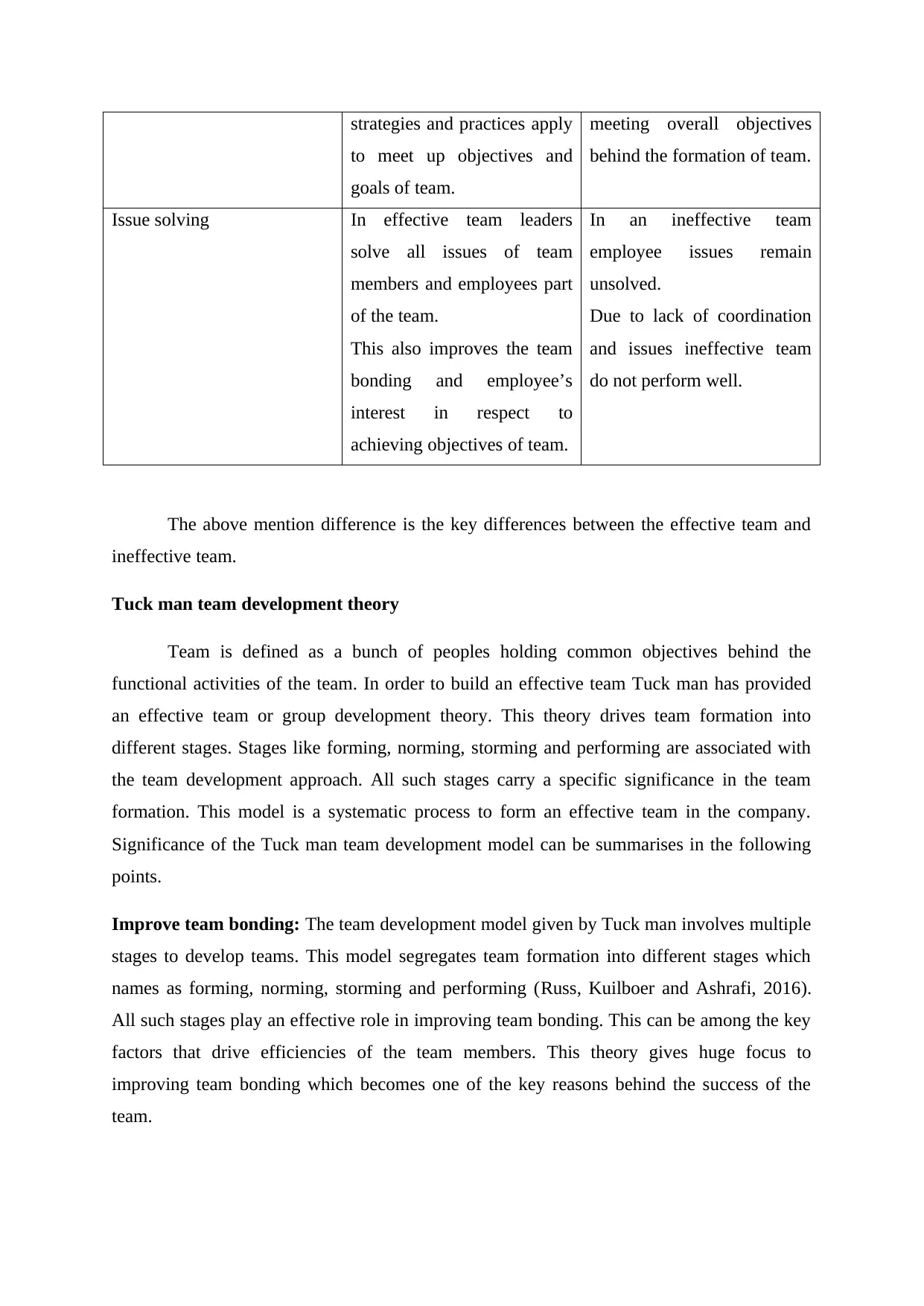
strategies and practices apply
to meet up objectives and
goals of team.
meeting overall objectives
behind the formation of team.
Issue solving In effective team leaders
solve all issues of team
members and employees part
of the team.
This also improves the team
bonding and employee’s
interest in respect to
achieving objectives of team.
In an ineffective team
employee issues remain
unsolved.
Due to lack of coordination
and issues ineffective team
do not perform well.
The above mention difference is the key differences between the effective team and
ineffective team.
Tuck man team development theory
Team is defined as a bunch of peoples holding common objectives behind the
functional activities of the team. In order to build an effective team Tuck man has provided
an effective team or group development theory. This theory drives team formation into
different stages. Stages like forming, norming, storming and performing are associated with
the team development approach. All such stages carry a specific significance in the team
formation. This model is a systematic process to form an effective team in the company.
Significance of the Tuck man team development model can be summarises in the following
points.
Improve team bonding: The team development model given by Tuck man involves multiple
stages to develop teams. This model segregates team formation into different stages which
names as forming, norming, storming and performing (Russ, Kuilboer and Ashrafi, 2016).
All such stages play an effective role in improving team bonding. This can be among the key
factors that drive efficiencies of the team members. This theory gives huge focus to
improving team bonding which becomes one of the key reasons behind the success of the
team.
to meet up objectives and
goals of team.
meeting overall objectives
behind the formation of team.
Issue solving In effective team leaders
solve all issues of team
members and employees part
of the team.
This also improves the team
bonding and employee’s
interest in respect to
achieving objectives of team.
In an ineffective team
employee issues remain
unsolved.
Due to lack of coordination
and issues ineffective team
do not perform well.
The above mention difference is the key differences between the effective team and
ineffective team.
Tuck man team development theory
Team is defined as a bunch of peoples holding common objectives behind the
functional activities of the team. In order to build an effective team Tuck man has provided
an effective team or group development theory. This theory drives team formation into
different stages. Stages like forming, norming, storming and performing are associated with
the team development approach. All such stages carry a specific significance in the team
formation. This model is a systematic process to form an effective team in the company.
Significance of the Tuck man team development model can be summarises in the following
points.
Improve team bonding: The team development model given by Tuck man involves multiple
stages to develop teams. This model segregates team formation into different stages which
names as forming, norming, storming and performing (Russ, Kuilboer and Ashrafi, 2016).
All such stages play an effective role in improving team bonding. This can be among the key
factors that drive efficiencies of the team members. This theory gives huge focus to
improving team bonding which becomes one of the key reasons behind the success of the
team.
Paraphrase This Document
Need a fresh take? Get an instant paraphrase of this document with our AI Paraphraser
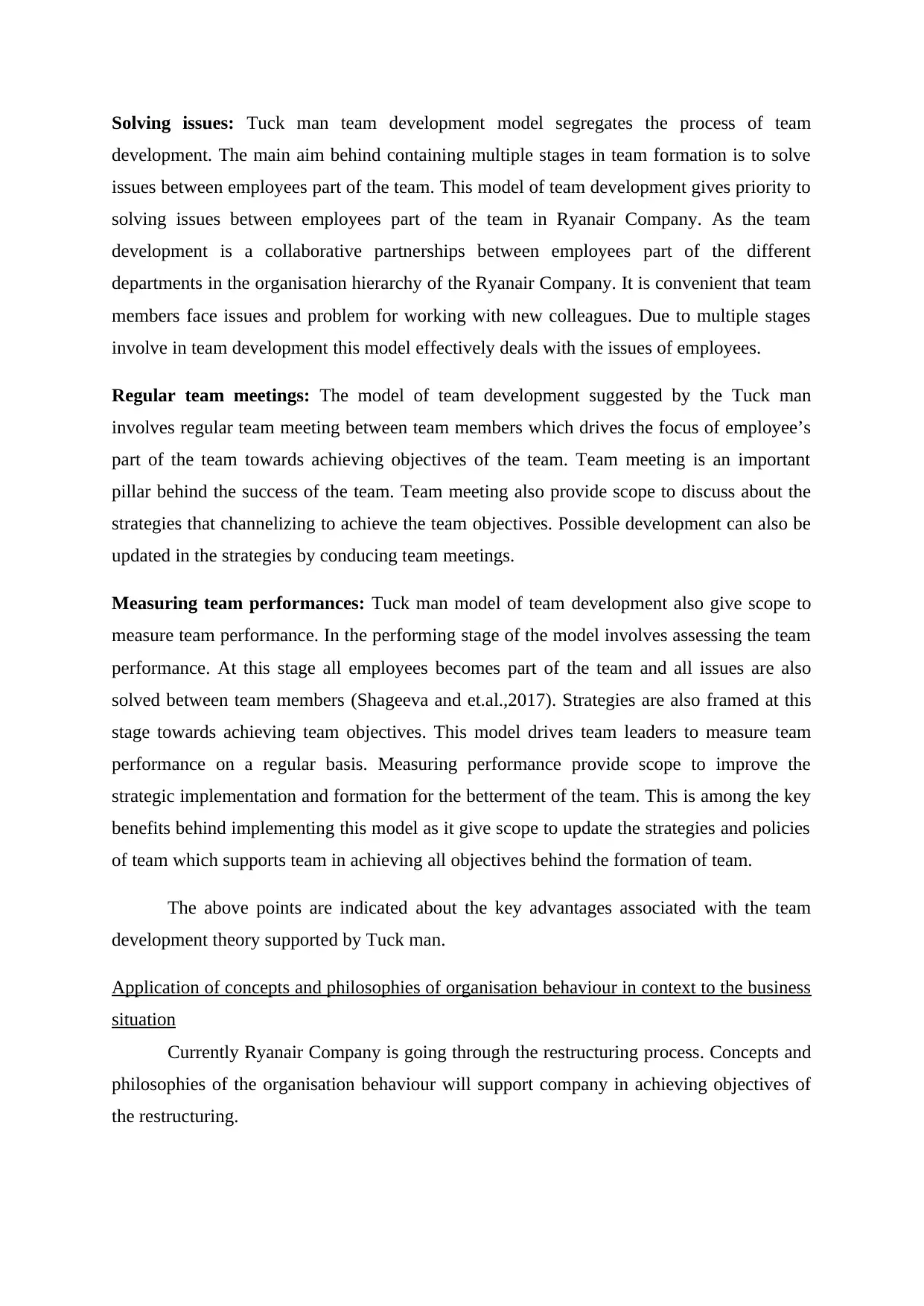
Solving issues: Tuck man team development model segregates the process of team
development. The main aim behind containing multiple stages in team formation is to solve
issues between employees part of the team. This model of team development gives priority to
solving issues between employees part of the team in Ryanair Company. As the team
development is a collaborative partnerships between employees part of the different
departments in the organisation hierarchy of the Ryanair Company. It is convenient that team
members face issues and problem for working with new colleagues. Due to multiple stages
involve in team development this model effectively deals with the issues of employees.
Regular team meetings: The model of team development suggested by the Tuck man
involves regular team meeting between team members which drives the focus of employee’s
part of the team towards achieving objectives of the team. Team meeting is an important
pillar behind the success of the team. Team meeting also provide scope to discuss about the
strategies that channelizing to achieve the team objectives. Possible development can also be
updated in the strategies by conducing team meetings.
Measuring team performances: Tuck man model of team development also give scope to
measure team performance. In the performing stage of the model involves assessing the team
performance. At this stage all employees becomes part of the team and all issues are also
solved between team members (Shageeva and et.al.,2017). Strategies are also framed at this
stage towards achieving team objectives. This model drives team leaders to measure team
performance on a regular basis. Measuring performance provide scope to improve the
strategic implementation and formation for the betterment of the team. This is among the key
benefits behind implementing this model as it give scope to update the strategies and policies
of team which supports team in achieving all objectives behind the formation of team.
The above points are indicated about the key advantages associated with the team
development theory supported by Tuck man.
Application of concepts and philosophies of organisation behaviour in context to the business
situation
Currently Ryanair Company is going through the restructuring process. Concepts and
philosophies of the organisation behaviour will support company in achieving objectives of
the restructuring.
development. The main aim behind containing multiple stages in team formation is to solve
issues between employees part of the team. This model of team development gives priority to
solving issues between employees part of the team in Ryanair Company. As the team
development is a collaborative partnerships between employees part of the different
departments in the organisation hierarchy of the Ryanair Company. It is convenient that team
members face issues and problem for working with new colleagues. Due to multiple stages
involve in team development this model effectively deals with the issues of employees.
Regular team meetings: The model of team development suggested by the Tuck man
involves regular team meeting between team members which drives the focus of employee’s
part of the team towards achieving objectives of the team. Team meeting is an important
pillar behind the success of the team. Team meeting also provide scope to discuss about the
strategies that channelizing to achieve the team objectives. Possible development can also be
updated in the strategies by conducing team meetings.
Measuring team performances: Tuck man model of team development also give scope to
measure team performance. In the performing stage of the model involves assessing the team
performance. At this stage all employees becomes part of the team and all issues are also
solved between team members (Shageeva and et.al.,2017). Strategies are also framed at this
stage towards achieving team objectives. This model drives team leaders to measure team
performance on a regular basis. Measuring performance provide scope to improve the
strategic implementation and formation for the betterment of the team. This is among the key
benefits behind implementing this model as it give scope to update the strategies and policies
of team which supports team in achieving all objectives behind the formation of team.
The above points are indicated about the key advantages associated with the team
development theory supported by Tuck man.
Application of concepts and philosophies of organisation behaviour in context to the business
situation
Currently Ryanair Company is going through the restructuring process. Concepts and
philosophies of the organisation behaviour will support company in achieving objectives of
the restructuring.
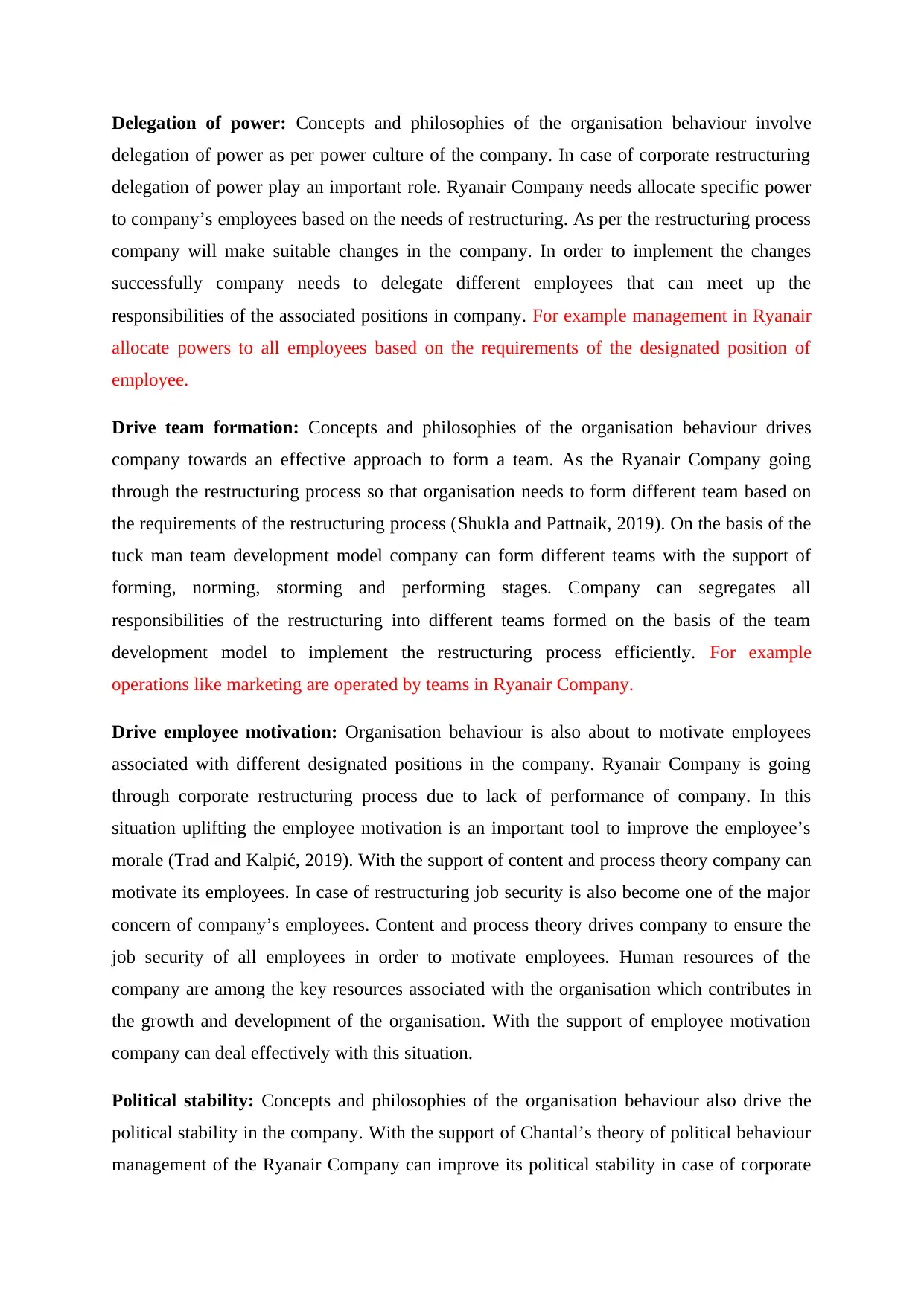
Delegation of power: Concepts and philosophies of the organisation behaviour involve
delegation of power as per power culture of the company. In case of corporate restructuring
delegation of power play an important role. Ryanair Company needs allocate specific power
to company’s employees based on the needs of restructuring. As per the restructuring process
company will make suitable changes in the company. In order to implement the changes
successfully company needs to delegate different employees that can meet up the
responsibilities of the associated positions in company. For example management in Ryanair
allocate powers to all employees based on the requirements of the designated position of
employee.
Drive team formation: Concepts and philosophies of the organisation behaviour drives
company towards an effective approach to form a team. As the Ryanair Company going
through the restructuring process so that organisation needs to form different team based on
the requirements of the restructuring process (Shukla and Pattnaik, 2019). On the basis of the
tuck man team development model company can form different teams with the support of
forming, norming, storming and performing stages. Company can segregates all
responsibilities of the restructuring into different teams formed on the basis of the team
development model to implement the restructuring process efficiently. For example
operations like marketing are operated by teams in Ryanair Company.
Drive employee motivation: Organisation behaviour is also about to motivate employees
associated with different designated positions in the company. Ryanair Company is going
through corporate restructuring process due to lack of performance of company. In this
situation uplifting the employee motivation is an important tool to improve the employee’s
morale (Trad and Kalpić, 2019). With the support of content and process theory company can
motivate its employees. In case of restructuring job security is also become one of the major
concern of company’s employees. Content and process theory drives company to ensure the
job security of all employees in order to motivate employees. Human resources of the
company are among the key resources associated with the organisation which contributes in
the growth and development of the organisation. With the support of employee motivation
company can deal effectively with this situation.
Political stability: Concepts and philosophies of the organisation behaviour also drive the
political stability in the company. With the support of Chantal’s theory of political behaviour
management of the Ryanair Company can improve its political stability in case of corporate
delegation of power as per power culture of the company. In case of corporate restructuring
delegation of power play an important role. Ryanair Company needs allocate specific power
to company’s employees based on the needs of restructuring. As per the restructuring process
company will make suitable changes in the company. In order to implement the changes
successfully company needs to delegate different employees that can meet up the
responsibilities of the associated positions in company. For example management in Ryanair
allocate powers to all employees based on the requirements of the designated position of
employee.
Drive team formation: Concepts and philosophies of the organisation behaviour drives
company towards an effective approach to form a team. As the Ryanair Company going
through the restructuring process so that organisation needs to form different team based on
the requirements of the restructuring process (Shukla and Pattnaik, 2019). On the basis of the
tuck man team development model company can form different teams with the support of
forming, norming, storming and performing stages. Company can segregates all
responsibilities of the restructuring into different teams formed on the basis of the team
development model to implement the restructuring process efficiently. For example
operations like marketing are operated by teams in Ryanair Company.
Drive employee motivation: Organisation behaviour is also about to motivate employees
associated with different designated positions in the company. Ryanair Company is going
through corporate restructuring process due to lack of performance of company. In this
situation uplifting the employee motivation is an important tool to improve the employee’s
morale (Trad and Kalpić, 2019). With the support of content and process theory company can
motivate its employees. In case of restructuring job security is also become one of the major
concern of company’s employees. Content and process theory drives company to ensure the
job security of all employees in order to motivate employees. Human resources of the
company are among the key resources associated with the organisation which contributes in
the growth and development of the organisation. With the support of employee motivation
company can deal effectively with this situation.
Political stability: Concepts and philosophies of the organisation behaviour also drive the
political stability in the company. With the support of Chantal’s theory of political behaviour
management of the Ryanair Company can improve its political stability in case of corporate
⊘ This is a preview!⊘
Do you want full access?
Subscribe today to unlock all pages.

Trusted by 1+ million students worldwide
1 out of 15
Related Documents
Your All-in-One AI-Powered Toolkit for Academic Success.
+13062052269
info@desklib.com
Available 24*7 on WhatsApp / Email
![[object Object]](/_next/static/media/star-bottom.7253800d.svg)
Unlock your academic potential
Copyright © 2020–2026 A2Z Services. All Rights Reserved. Developed and managed by ZUCOL.





